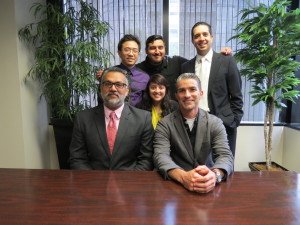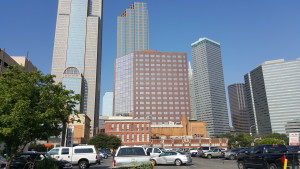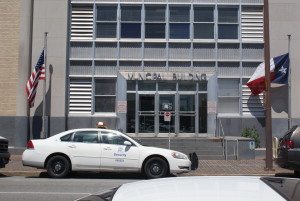DWI Laws and Punishments

There are more consequences to a DWI than just paying a simple fine or being placed on probation. The potential consequences increase as the severity of the DWI charge increases. In Texas, the Penal Code describes the available punishments as follows:
Sec. 49.04. DRIVING WHILE INTOXICATED. (a) A person commits an offense if the person is intoxicated while operating a motor vehicle in a public place.
(b) Except as provided by Subsection (c) and Section 49.09, an offense under this section is a Class B misdemeanor, with a minimum term of confinement of 72 hours.
(c) If it is shown on the trial of an offense under this section that at the time of the offense the person operating the motor vehicle had an open container of alcohol in the person’s immediate possession, the offense is a Class B misdemeanor, with a minimum term of confinement of six days.
Added by Acts 1993, 73rd Leg., ch. 900, Sec. 1.01, eff. Sept. 1, 1994. Amended by Acts 1995, 74th Leg., ch. 76, Sec. 14.55, eff. Sept. 1, 1995.
Sec. 49.045. DRIVING WHILE INTOXICATED WITH CHILD PASSENGER. (a) A person commits an offense if:
(1) the person is intoxicated while operating a motor vehicle in a public place; and
(2) the vehicle being operated by the person is occupied by a passenger who is younger than 15 years of age.
(b) An offense under this section is a state jail felony.
Added by Acts 2003, 78th Leg., ch. 787, Sec. 1, eff. Sept. 1, 2003.

Sec. 49.09. ENHANCED OFFENSES AND PENALTIES. (a) Except as provided by Subsection (b), an offense under Section 49.04, 49.05, 49.06, or 49.065 is a Class A misdemeanor, with a minimum term of confinement of 30 days, if it is shown on the trial of the offense that the person has previously been convicted one time of an offense relating to the operating of a motor vehicle while intoxicated, an offense of operating an aircraft while intoxicated, an offense of operating a watercraft while intoxicated, or an offense of operating or assembling an amusement ride while intoxicated.
(b) An offense under Section 49.04, 49.05, 49.06, or 49.065 is a felony of the third degree if it is shown on the trial of the offense that the person has previously been convicted:
(1) one time of an offense under Section 49.08 or an offense under the laws of another state if the offense contains elements that are substantially similar to the elements of an offense under Section 49.08; or
(2) two times of any other offense relating to the operating of a motor vehicle while intoxicated, operating an aircraft while intoxicated, operating a watercraft while intoxicated, or operating or assembling an amusement ride while intoxicated.
(b-1) An offense under Section 49.07 is a felony of the second degree if it is shown on the trial of the offense that the person caused serious bodily injury to a peace officer, a firefighter, or emergency medical services personnel while in the actual discharge of an official duty.
(b-2) An offense under Section 49.08 is a felony of the first degree if it is shown on the trial of the offense that the person caused the death of a person described by Subsection (b-1).
(b-3) For the purposes of Subsection (b-1):
(1) “Emergency medical services personnel” has the meaning assigned by Section 773.003, Health and Safety Code.
(2) “Firefighter” means:
(A) an individual employed by this state or by a political or legal subdivision of this state who is subject to certification by the Texas Commission on Fire Protection; or
(B) a member of an organized volunteer fire-fighting unit that:
(i) renders fire-fighting services without remuneration; and
(ii) conducts a minimum of two drills each month, each at least two hours long.
(c) For the purposes of this section:
(1) “Offense relating to the operating of a motor vehicle while intoxicated” means:
(A) an offense under Section 49.04 or 49.045;
(B) an offense under Section 49.07 or 49.08, if the vehicle operated was a motor vehicle;
(C) an offense under Article 6701l-1, Revised Statutes, as that law existed before September 1, 1994;
(D) an offense under Article 6701l-2, Revised Statutes, as that law existed before January 1, 1984;
(E) an offense under Section 19.05(a)(2), as that law existed before September 1, 1994, if the vehicle operated was a motor vehicle; or
(F) an offense under the laws of another state that prohibit the operation of a motor vehicle while intoxicated.
(2) “Offense of operating an aircraft while intoxicated” means:
(A) an offense under Section 49.05;
(B) an offense under Section 49.07 or 49.08, if the vehicle operated was an aircraft;
(C) an offense under Section 1, Chapter 46, Acts of the 58th Legislature, Regular Session, 1963 (Article 46f-3, Vernon’s Texas Civil Statutes), as that law existed before September 1, 1994;
(D) an offense under Section 19.05(a)(2), as that law existed before September 1, 1994, if the vehicle operated was an aircraft; or
(E) an offense under the laws of another state that prohibit the operation of an aircraft while intoxicated.
(3) “Offense of operating a watercraft while intoxicated” means:
(A) an offense under Section 49.06;
(B) an offense under Section 49.07 or 49.08, if the vehicle operated was a watercraft;
(C) an offense under Section 31.097, Parks and Wildlife Code, as that law existed before September 1, 1994;
(D) an offense under Section 19.05(a)(2), as that law existed before September 1, 1994, if the vehicle operated was a watercraft; or
(E) an offense under the laws of another state that prohibit the operation of a watercraft while intoxicated.
(4) “Offense of operating or assembling an amusement ride while intoxicated” means:
(A) an offense under Section 49.065;
(B) an offense under Section 49.07 or 49.08, if the offense involved the operation or assembly of an amusement ride; or
(C) an offense under the law of another state that prohibits the operation of an amusement ride while intoxicated or the assembly of a mobile amusement ride while intoxicated.
(d) For the purposes of this section, a conviction for an offense under Section 49.04, 49.045, 49.05, 49.06, 49.065, 49.07, or 49.08 that occurs on or after September 1, 1994, is a final conviction, whether the sentence for the conviction is imposed or probated.
(e) Repealed by Acts 2005, 79th Leg., Ch. 996, Sec. 3, eff. September 1, 2005.
(f) Repealed by Acts 2005, 79th Leg., Ch. 996, Sec. 3, eff. September 1, 2005.
(g) A conviction may be used for purposes of enhancement under this section or enhancement under Subchapter D, Chapter 12, but not under both this section and Subchapter D.

(h) This subsection applies only to a person convicted of a second or subsequent offense relating to the operating of a motor vehicle while intoxicated committed within five years of the date on which the most recent preceding offense was committed. The court shall enter an order that requires the defendant to have a device installed, on each motor vehicle owned or operated by the defendant, that uses a deep-lung breath analysis mechanism to make impractical the operation of the motor vehicle if ethyl alcohol is detected in the breath of the operator, and that requires that before the first anniversary of the ending date of the period of license suspension under Section 521.344, Transportation Code, the defendant not operate any motor vehicle that is not equipped with that device. The court shall require the defendant to obtain the device at the defendant’s own cost on or before that ending date, require the defendant to provide evidence to the court on or before that ending date that the device has been installed on each appropriate vehicle, and order the device to remain installed on each vehicle until the first anniversary of that ending date. If the court determines the offender is unable to pay for the device, the court may impose a reasonable payment schedule not to extend beyond the first anniversary of the date of installation. The Department of Public Safety shall approve devices for use under this subsection. Section 521.247, Transportation Code, applies to the approval of a device under this subsection and the consequences of that approval. Failure to comply with an order entered under this subsection is punishable by contempt. For the purpose of enforcing this subsection, the court that enters an order under this subsection retains jurisdiction over the defendant until the date on which the device is no longer required to remain installed. To the extent of a conflict between this subsection and Section 13(i), Article 42.12, Code of Criminal Procedure, this subsection controls.
Added by Acts 1993, 73rd Leg., ch. 900, Sec. 1.01, eff. Sept. 1, 1994. Amended by Acts 1995, 74th Leg., ch. 76, Sec. 14.56, eff. Sept. 1, 1995; Acts 1995, 74th Leg., ch. 318, Sec. 21, eff. Sept. 1, 1995; Acts 1999, 76th Leg., ch. 1364, Sec. 12, 13, eff. Jan. 1, 2000; Acts 2001, 77th Leg., ch. 648, Sec. 1, 2, eff, Sept. 1, 2001; Acts 2001, 77th Leg., ch. 969, Sec. 3, eff. Sept. 1, 2001; Acts 2003, 78th Leg., ch. 787, Sec. 2, eff. Sept. 1, 2003; Acts 2003, 78th Leg., ch. 1275, Sec. 2(117), eff. Sept. 1, 2003.
Amended by:
Acts 2005, 79th Leg., Ch. 996, Sec. 1, eff. September 1, 2005.
Acts 2005, 79th Leg., Ch. 996, Sec. 3, eff. September 1, 2005.
Acts 2007, 80th Leg., R.S., Ch. 662, Sec. 4, eff. September 1, 2007.
In addition to those consequences listed above, you may be ordered to the following:
• Community supervision
• Community service
• Court ordered classes, e.g., DWI Education, Victims Impact Panel (VIP)
• Ignition interlock
• Annual surcharges
• Drivers license suspension
So, if you are looking for a DWI Attorney in Dallas, DWI Attorney in Ft. Worth, DWI Attorney in Plano, DWI Attorney in Denton, DWI Attorney in Garland, DWI Attorney in Mesquite, DWI Attorney in Frisco, DWI Attorney in Irving, DWI Attorney in Richardson, DWI Attorney in McKinney, DWI Attorney in Allen, DWI Attorney in Bedford, DWI Attorney in Euless, DWI Attorney in Hurst, DWI Attorney in Arlington, DWI Attorney in Grand Prairie, DWI Attorney in Grapevine, or anywhere else in the Dallas-Fort Worth Metroplex then please click on the following link to learn more about DWI’s.
